Outreach and Evangelism
7 minute read
What’s the difference, and does it really matter?
These two words are often used somewhat interchangeably, but clarity about what they mean (and conversely, what they don’t) is important.
In the simplest of terms, outreach is reaching out—relationship building, while evangelism is good news—gospel sharing.
Outreach is a move; evangelism is the message.
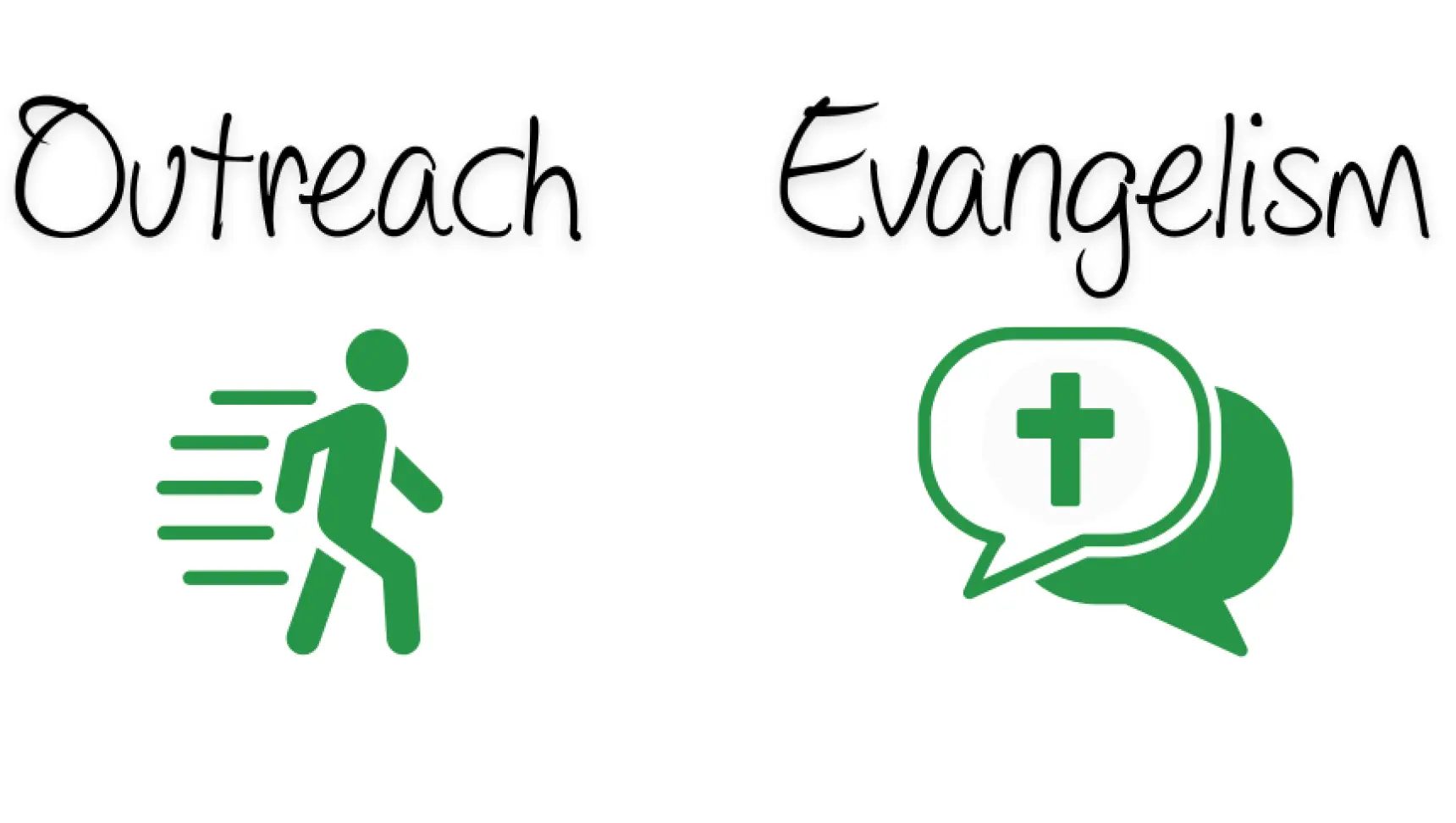
Activities designed to highlight the church's groups, demonstrate compassion in your community and build relationships are perfect examples of outreach.
Food banks, knit and natter, toddler groups, coffee mornings and other activities like these are a wonderful way to make an impact in the community, allowing people to enter the church building and mingle with Christians in an informal way. Relationships can be built around such activities and serve a great purpose of outreach.
We recently heard of some great outreach activities going on at St Saviours, Bamber Bridge.
St Saviour’s is a church in the early stages of revitalisation, so are working hard at building positive relationships in the community. One aspect of this is to build connections with families in their local school and across the wider community. As well as advertising all their events in the school newsletter, they also advertise widely in local Facebook groups. Each week of the school holidays they organise a free family event including a free lunch. They have recently tried Nerf and Nuggets.
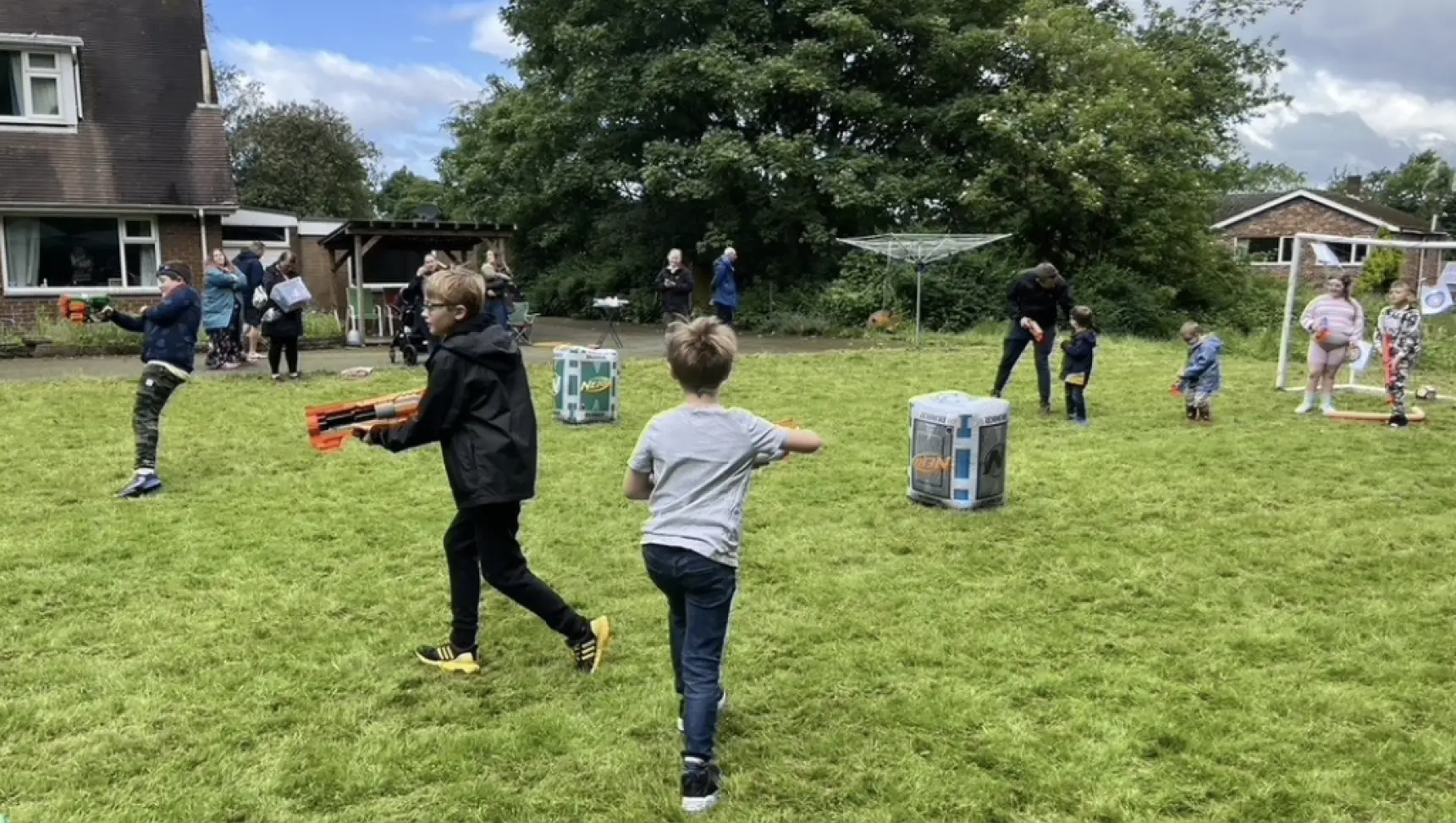
Shelley Logan, Community and Family Worker, explains how it worked:
“The session lasted for 2 hours. The first 45 minutes included target practice (targets hanging from football goals), shooting at tin cans, targets on trees and shooting into hula hoops. The next 45 mins were various ‘battles.’ We concluded our time with nuggets and chips. A great time was had by all!”
Other similar family outreach events they have run this summer include a mini olympics, scavenger hunt, and outdoor games. They have also run indoor games and Lego events in the winter months.
Shelley explains how this feeds into their evangelism strategy:
“If we have anything special coming up we always advertise at these events. We also take contact details and send invitations to our next events and include details of regular services and Christianity Explored courses in the email. We often give away 10ofThose evangelistic literature as well.”
Outreach is often a demonstration of generosity, an outpouring of love and service, which is welcomed and valued, even by those opposed to faith and Christianity. It causes no offense.
Outreach is helpful, but evangelism is essential.
“Evangelism is very specific. It is proclaiming the gospel to non-Christians who are listening.”
Writes Roger Carswell in Evangelistic Living
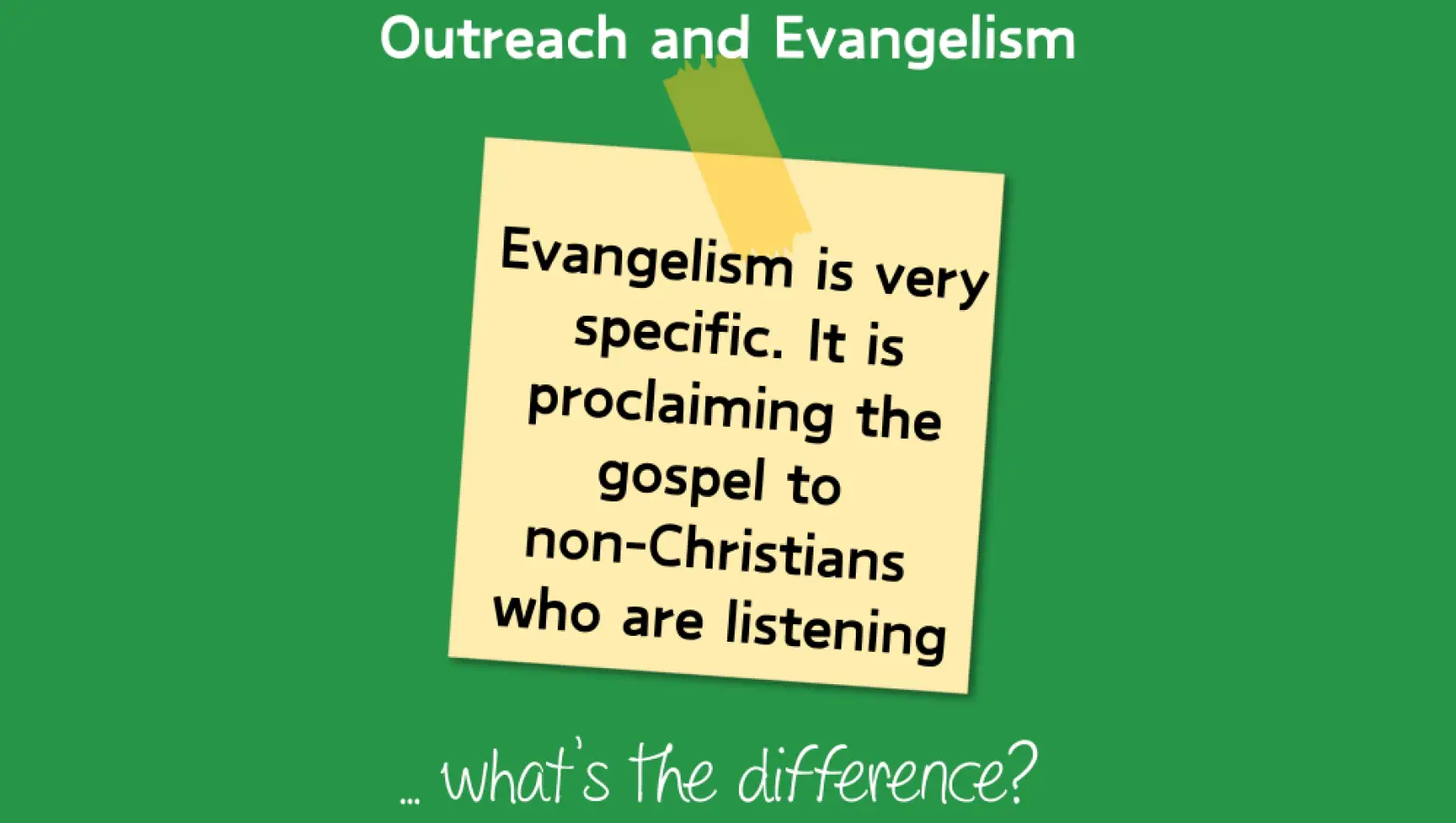
Do you remember the fire triangle which your school science teacher taught? Three things are needed for fire: oxygen, heat and fuel. Take any of those elements away and you don’t have fire.
It’s the same with evangelism. Sharing the gospel, with non-Christians, who are listening. All three parts are required for evangelism to be taking place.
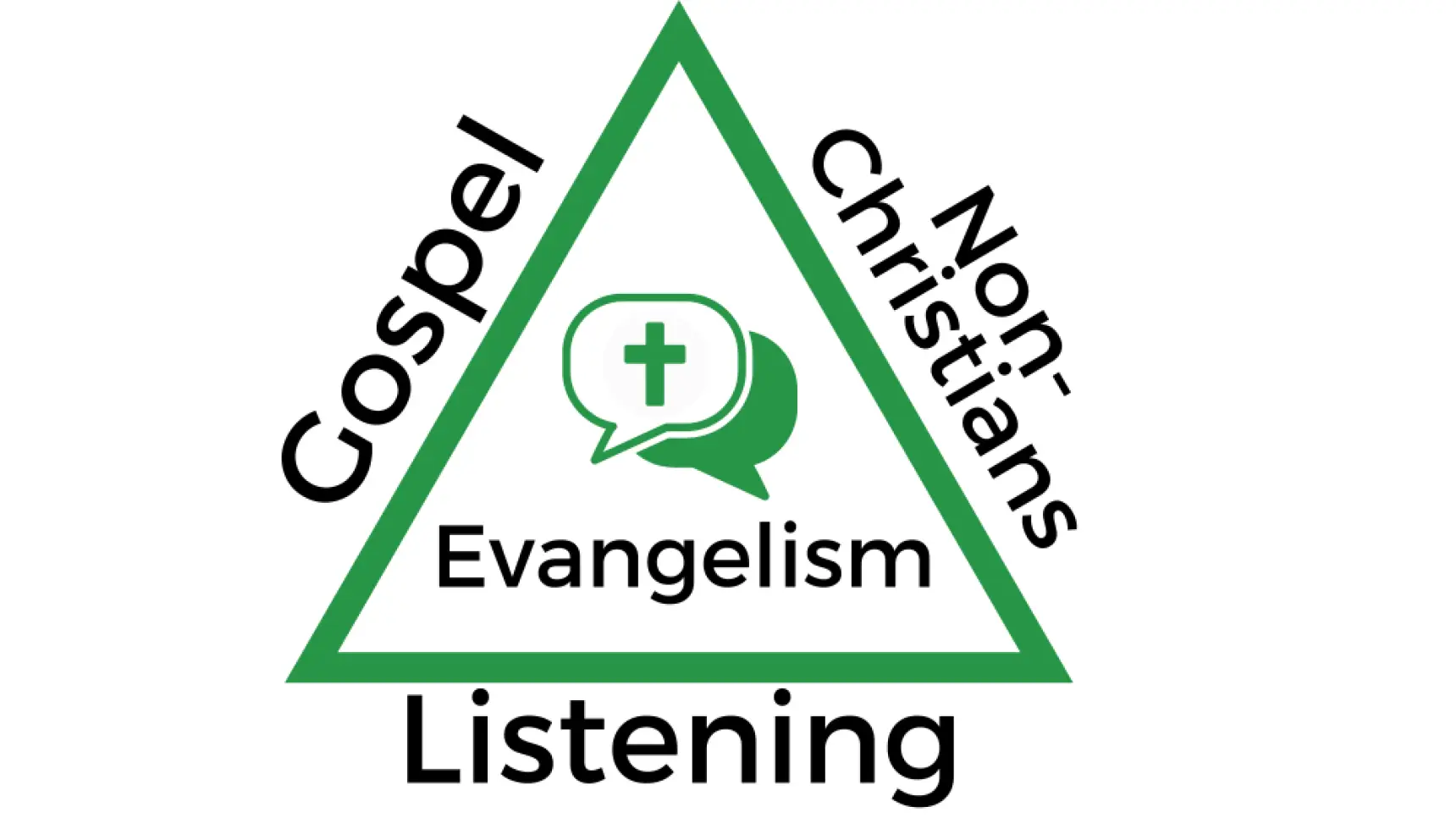
Whenever your church is planning evangelism, do you consider these three things?
Will there be non-Christians?
How will you share the gospel clearly?
How will you engage them to listen?
It has been said that outreach is building a bridge which then enables us to carry the gospel across, but sometimes we spend so long building the bridge that nothing ever makes it across. Alternatively we worry about the strength of the bridge and don’t want to risk it collapsing, so we never attempt to cross it.
Graham Peel, Pastor of Northwood Chapel, Kirkby, says
“We have found that the most effective means of delivering the gospel is to meet people on their turf and communicate with them in terms they can understand.
In the most recent decade the ground on which this most often happens has gradually and remarkably shifted to the chapel in which we house various ministries.
Each ministry has one aim: to glorify the Lord Jesus by obeying His commandment to preach the kingdom of heaven to all who He brings across our path.
In our foodbank we seek to give the bread of life to those who come with a practical need. Some come in crises looking for answers. Some come simply for a little material help. Some gospel opportunities are immediate. Some take years. One of our regular foodbank users became one of our volunteers, then started attending services and recently professed salvation at our summer “Hope Explored” course.
We’re ready to present the gospel at any and every opportunity – according to the time frame the Lord sets.”
How could you make an outreach event evangelistic?
Have a gospel talk - Depending on the audience, the length and style of this may vary. Using visuals can be helpful, keeping in mind the essential components of the gospel.
“For I deliver to you as of first importance what I also received: that Christ died for our sins in accordance with the Scriptures, that He was buried, that He was raised on the third day in accordance with the Scriptures, and that He appeared to Cephas, then to the twelve.”
1 Corinthians 15 v 3-5
There are many helpful gospel outlines which can be used such as Two Ways to Live, the Romans Road, The Bridge, etc.
Include a clear gospel testimony - People are interested in people, and sharing how faith became personal, and how God has saved and moved in someone's life, is very effective. For those not confident in giving a solo testimony, an interview style allows direction to be added to delve deeper into the background of conversion, and the interviewer can naturally summarise the key points of the gospel at the end.
Highlight a gospel resource (Bible, tract, book, magazine) and give everyone a copy
Be intentional in personal conversations
Having something suitable to give to people to take away and read on their own is important.
Resources are often taken more readily when the contents are explained:
Gospels - “If you’d like to read an account of Jesus’ life…”
Apologetics books - “This book has the answers to many commonly asked questions about who Jesus was and why His life is so important to each one of us…”
Testimony Books - “You can read the stories of many people whose lives have been transformed by Jesus…”
Tracts - “This short Christian leaflet explains…”
Steve Neal, Pastor to the Community at Christ Church Dunstable, explains how they use outreach activities as a springboard for evangelism:
“Christ Church Dunstable runs a Christian café and community centre called The Way Coffee House which runs community outreach groups (art groups, crafts groups, a group for over 60s, and ‘men in sheds’ style group) throughout the week. All of the groups running in The Way are gospel focussed and are designed to give us an opportunity for evangelism.
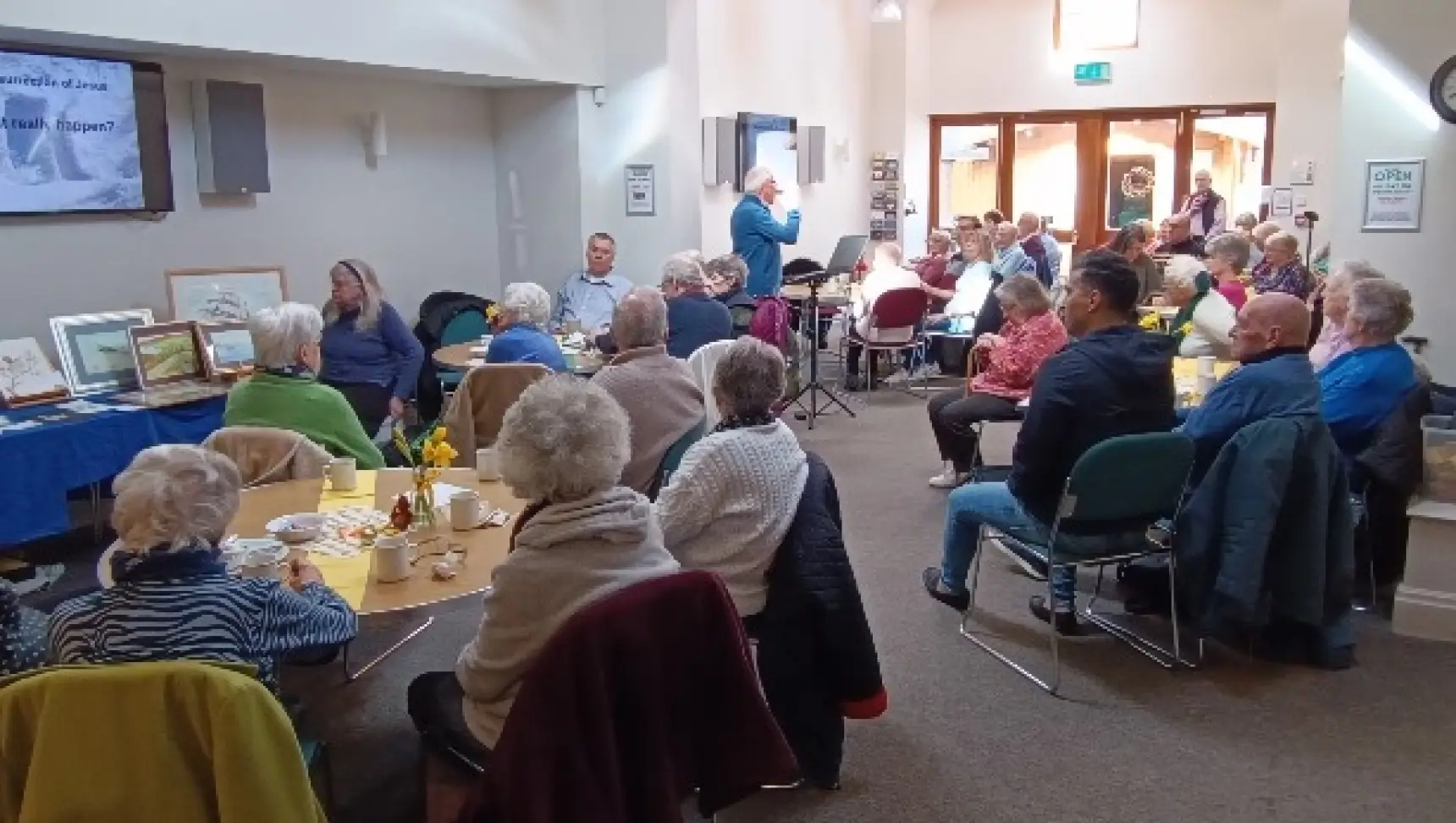
There are several ways we use these outreach groups for evangelism.
They are a great environment for people to meet Christians for the first time.
The groups are not only run by church members but they are also attended by church folk as well. We should never underestimate the impact that sharing our lives has with others, especially when we are unashamedly ‘Christian’ in the way we live. We have seen many people move from coming to a weekday group to coming to a church service on a Sunday, because they’ve made friends with Christians in the groups and have been invited along. We have heard the impact of this in the testimonies of those getting baptised after coming to faith after meeting Jesus.We use these groups as a way of inviting folk to other evangelistic events.
We always try to have something on the horizon that we can be inviting others to. The Bible tells us to make the most of every opportunity. In our groups and on all the tables we will often have postcards and information of upcoming services and events happening in the church. On the walls of our centre we have racks of postcards for all kinds of things such as other groups, church services, Christianity Explored courses etc. We try to make information as widely available as possible.Each of our weekly activities has an engaging Gospel focussed ‘Thought for the Week’
One of our policies in The Way is that each of our groups has to have some kind of gospel purpose. A few events might be purely for people to come into contact with the church for the first time, but most of our groups have a gospel talk as part of the morning program. I usually place it about halfway through the session because it is a) at the heart of what we do, b) it is when the late comers have arrived and it’s before the early-leavers have gone. We advertise this on all of our invitations because we want people to know what to expect and not to turn up and feel that we’ve tricked them. And while this may seem like a bold approach it doesn’t seem to put people off because we can get upwards of 45 people in our groups. I, along with the other church goers in the group, will then seek to have informal follow-up conversations following the talk around the tables.
It’s a privilege to preach the gospel week after week to a group of people who start off as strangers, but then become friends, and, Lord willing, go on to become brothers and sisters in Christ.”
How could your current outreach point to evangelistic opportunities?
If there isn’t the scope to include evangelism directly in your outreach activities, they can still be used as a way to advertise evangelistic services and courses.
Handing out personal invitations for the evangelistic carol service to your whole Knit and Natter group or inviting the parents from your toddler group to the upcoming Christianity Explored course are two very simple examples. Aim to do something like this regularly.
Outreach is a wonderful way to show God's love in a real and tangible way, but without evangelism the good news of salvation through Jesus’ death and resurrection cannot be understood and accepted personally.
Let us encourage one another to keep the gospel central to all that we do, that God would use our service for His glory.